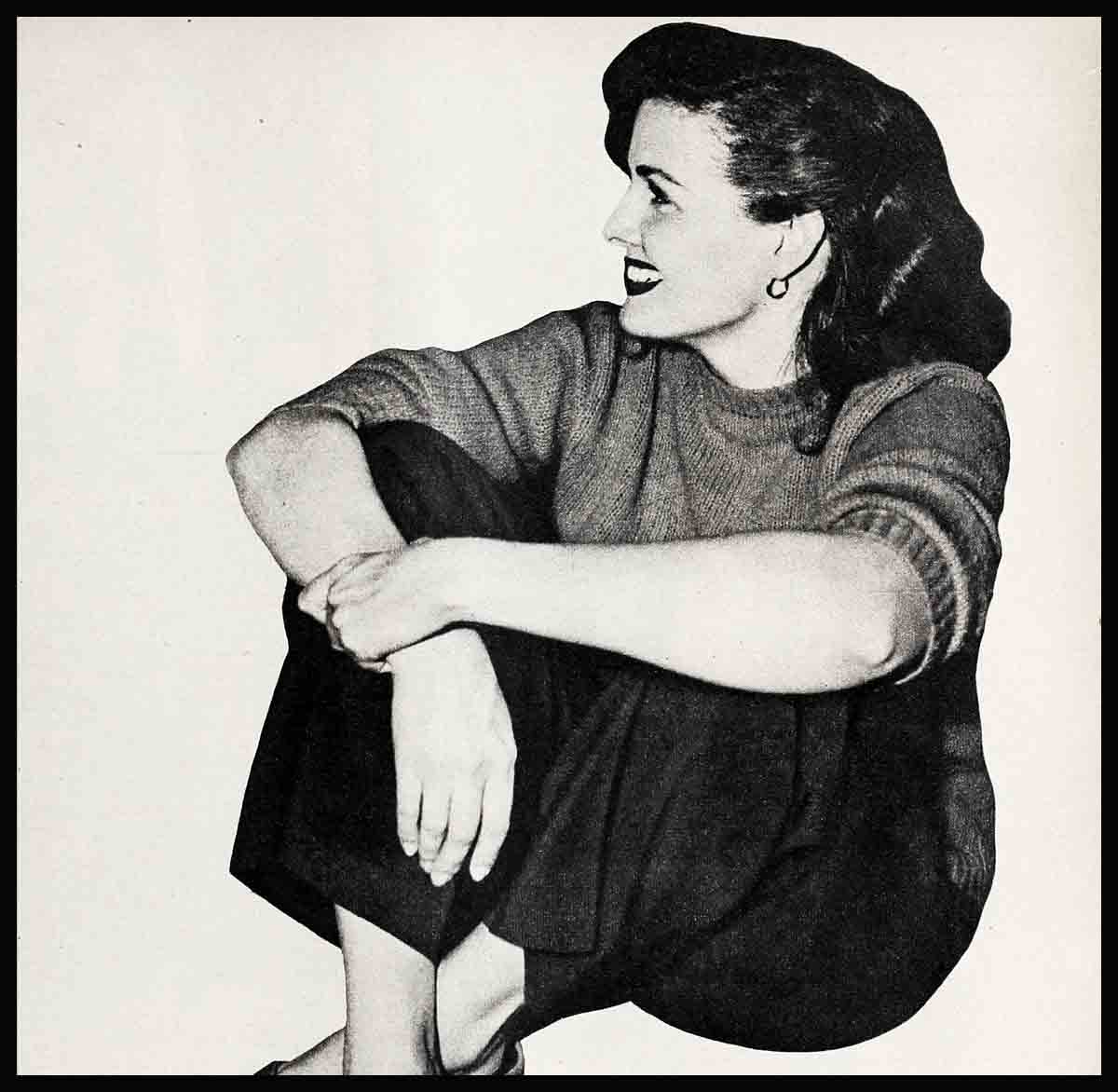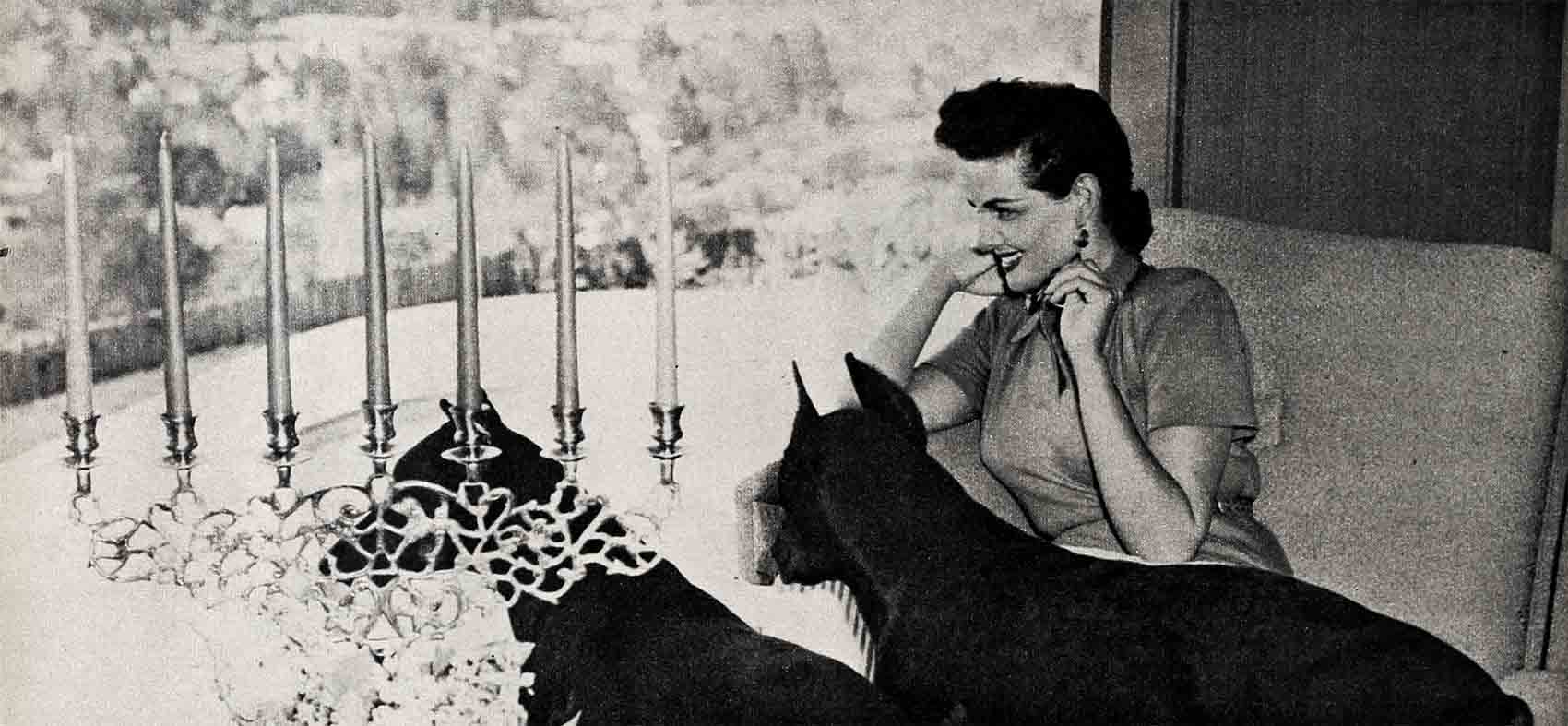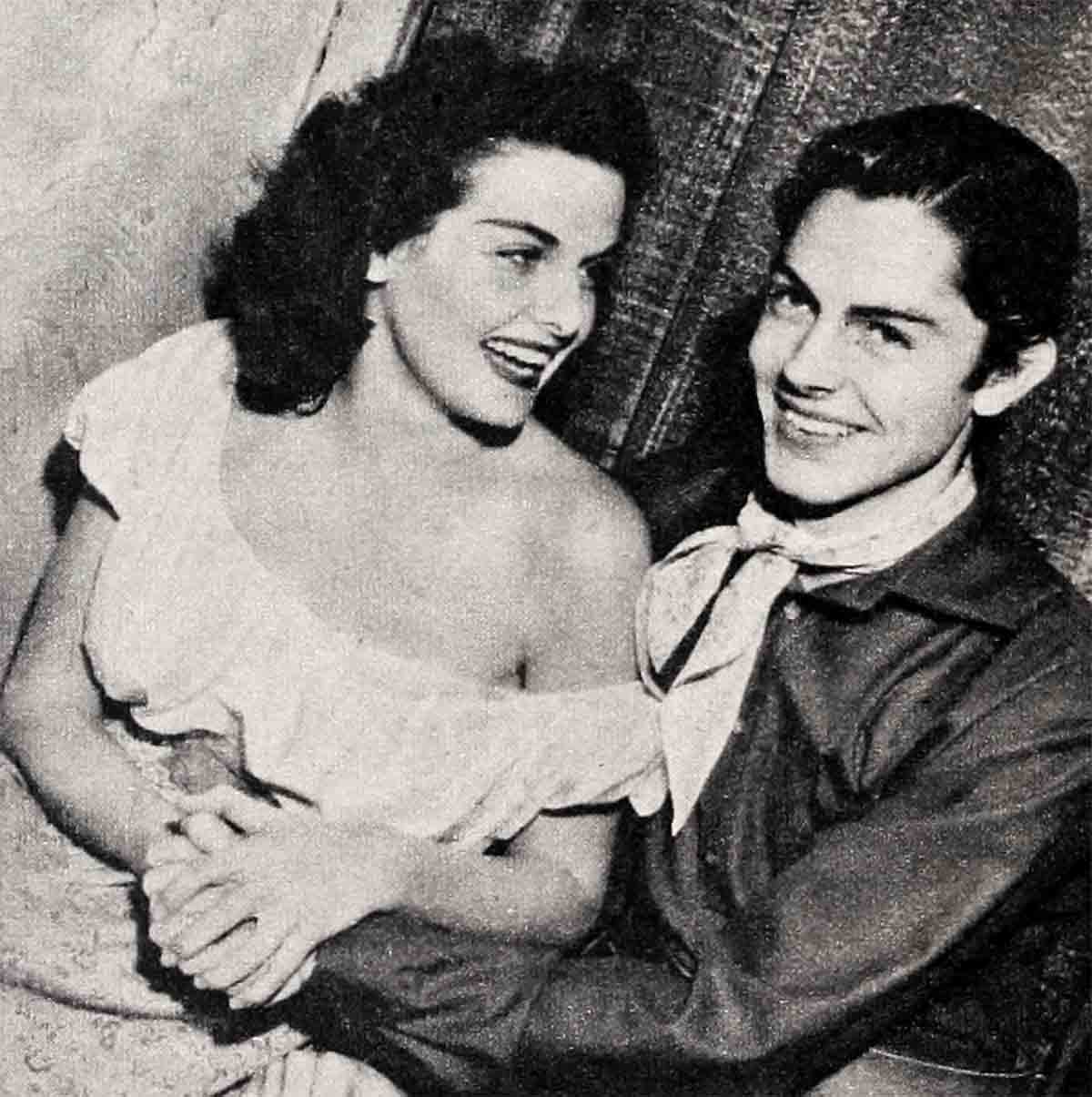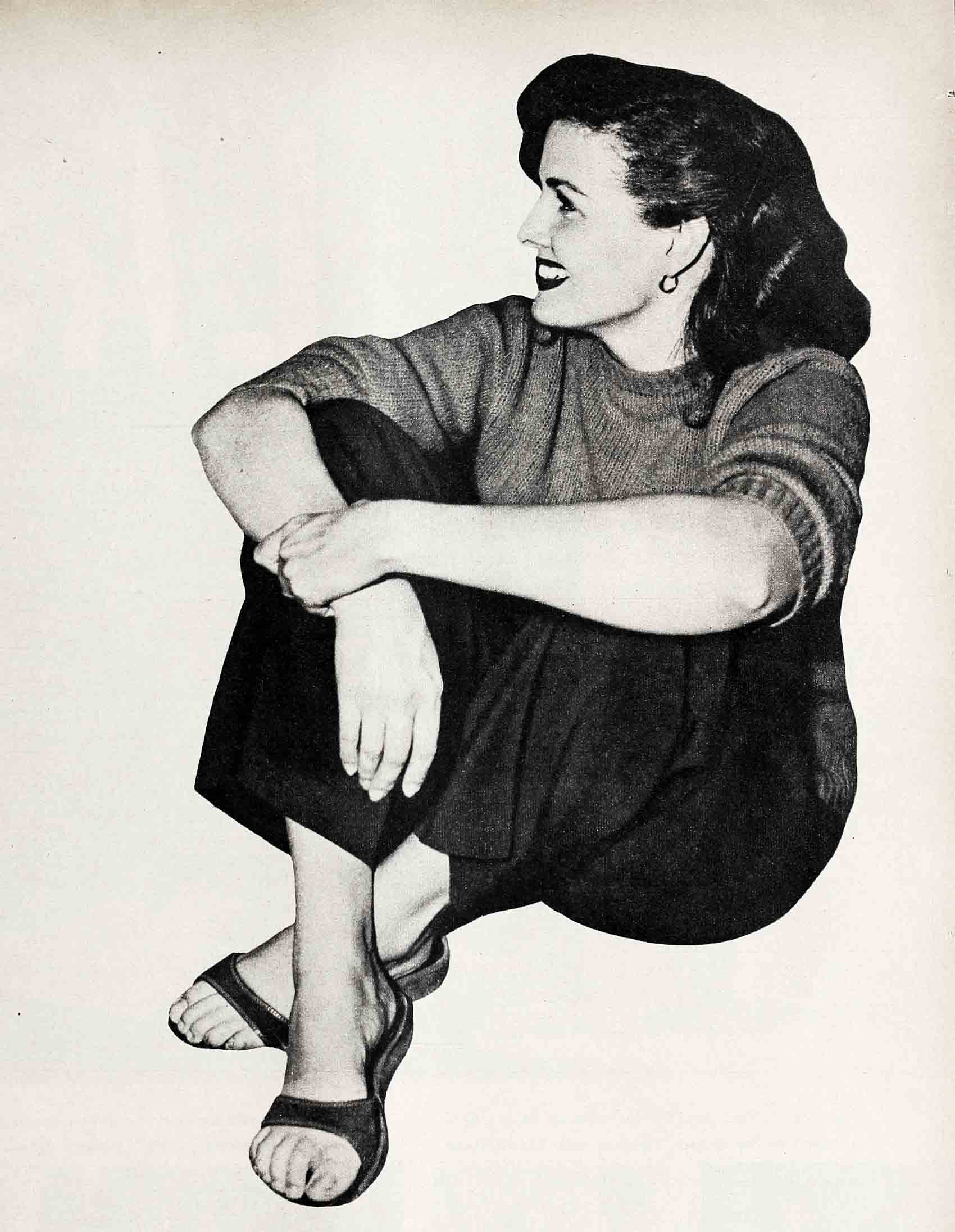
Just Plain Jane Russell
Tell Jane Russell she’s gorgeous, and she’ll pull in like a snail. Persist, and you’ll find yourself talking to vacancy. Jane has withdrawn. Inside herself, if that’s the best she can do. Headed for the nearest exit, if she can manage it. The quickest way not to make a hit with Russell is to feed her taffy.
She’s gorgeous, all right, and not only the much touted anatomy. Give yourself a chance, and the face is worth looking at, too. So is the character behind the face. Here’s that rare bird who remains what she was before ’ they dunked her into the Hollywood klieg lights. Head clear and feet on the firm, firm ground. Straight-thinking, outspoken and blessed with a comic sense that she plays on herself like a hose. A strictly well-balanced human. The only compliment she’ll thank you for is to treat her as such, instead of making with the horsefeathers.
Husband, family, old friends, the ways she grew up in—these are the heart of life to Jane. She thinks her job’s swell and the money remarkable, but continues to regard the whole business with a wary eye—like a duck who’s mothered some strange egg, hatched out a peacock, and concludes there’s something wacky about it because there is.
The last thing she intended to be was an actress, though at school her three loves were art, music and the drama. Everything else she hated. Math was a jungle. All the way through math, she sensibly spent her time drawing pictures and planning her future as a designer. After graduation Mom asked, “How about dramatic school? They teach dancing and diction, which can’t do you any harm.”

So Jane went to Reinhardt’s. But there was too much watching, and not enough doing. Jane was glad when a good school of design turned up. With the tuition check in her pocket, she stopped at Ouspenskaya’s to see her best friend who was studying dramatics. Pat seemed to be having run, and Jane reached a decision. For Jane, to decide is to act. She turned over her check. Design’s loss was Ouspenskaya’s gain.
While studying, Jane worked as a model to earn money. At the same time, two Howards were making a deal. Hughes (Howard) signed Hawks (Howard) to direct “The Outlaw.” For the leads they wanted new faces. Agents ransacked the town, scooping up photos. One of them appeared at Tom Kelly’s studio. Shortly thereafter, he reappeared in a fine glow of triumph. “This one,” he said—
Kelly took a look, and groaned. “Oh no, not that one—”
“Whaddaya mean, not that one? I showed the whole bunch to Hawks, and this one he picked — ”
“Leave her alone, she’s a nice little country kid—”
“Look, are you the girl’s father? Let her decide.”
Reluctantly, Kelly supplied Jane’s number. She was at a ranch, visiting cousins, not expected back for three days.
“Can’t you get her in sooner?”
“That’s up to her,” said Jane’s mother, and gave him the ranch number.
Indulgent but skeptical, Jane heard the agent out. “That’s fine,” she said. “I’ll be back in three days.”

His blood pressure moved up. “Hey, don’t you want to be a movie star?”
“Sure, sure,” she soothed him. “I’ll see you in three days—”
Three days later he took her to Howard Hawks’s office. “We’ll test her with the others,” said Hawks. The others included six girls and eight boys.
“Who do you think’ll get it?” she asked Hawks.
He grinned. “Jack Beutel. And you—”
Jane felt fine. Her mother felt fine.
But Robert Waterfield felt the reverse of fine. She was seventeen when they started going together. She was nineteen when fate and “The Outlaw” struck. The news, you’ll remember, broke fast—and with illustrations. At UCLA, where Bob flourished as the team’s star quarterback, he bowed his head to the storm.
His feelings have gone through several revolutions since. Robert saw that this was a hard-working industry of hard-working people. He relaxed. When he’s ready to give up pro football with the Rams, he may go into Westerns himself. Meantime Jane’s pictures don’t interest him. Having sat through one, he’ll say, “It was all right,” and turn to a discussion of fishing or football. Or he’ll say: “Are you making money? If you’re making money, okay—”
Which tickles his wife. “He should have been an agent, that one.”
They were married in 1942. You’ve heard that no two people could be more different, nor happier together. You ask Jane about these differences.

“He’s a boy, I’m a girl,” she starts off drily. “He’s conservative—that’s the English in him. I’m not—maybe that’s the Polish in me. He likes sports, except the ones I like—swimming and riding. Football I can take so much of, and no more. He loves golf, I loathe it. All his friends are in the sports world. My gal friends are the art, music and drama kids I went to school with. Robert doesn’t know or want to know from art, music and drama. We have huge arguments about it, and that’s all. No nagging, no picking.
“We’re not the kind who make a production of our feelings, or think you have to hold hands till twelve o’clock high. If he goes on a football trip, I may meet him somewhere—then fly to New York, see plays, hear concerts, tramp galleries. This would kill Robert. Why should I make him suffer? Why should I suffer through too much football? We let each other live.”
They’re living in what Jane refuses to call the dream house—a sticky term, over which she chokes. “Call it a paradox too. Modern, with old Chinese furniture. Vines trained outside to cover the rough brown planks. So it’ll soon look a million years old—I hope.” Robert’s project was the downstairs playroom for football brawls.
“We live such a sort of cornball life,” says Jane. “It’s so much easier to be with the old friends. Two of the movie crowd who really fit in are Bob and Dorothy Mitchum.” He and Jane have just been teamed for the first time in “His Kind of Woman.”
Until three months ago the Waterfield household was maidless. That’s how Robert wanted it. One day a friend called. “Jane, there’s this marvelous Swiss woman. D’you know anyone who could use her?”

“No one but me,” Jane heard herself saying. That night she approached Robert. “I’ll be going back to work soon. It won’t be so easy to keep my end of things up. Why don’t we try her?”
He marshaled the usual arguments. Jane marshaled hers. “We’re not marrying her. If she doesn’t work out, what have we got to lose but a month’s salary?”
“Oh, I suppose so.” The male, fed up, giving in to a woman’s caprice.
She’d been there two days. She’d served them their second dinner. Jane watched Robert’s eyes follow her from the room. “Wife, I just had a horrible thought. She may leave us someday.”
Since the time of their marriage, he’s never called her anything but “Wife.” Her four younger brothers call her “Daughter.” The girls call her “Our Movie Star Friend” or “The Queen”—very sarcastic. “We’re going to ‘Our Movie Star Friend’s’ house to use the pool.”
Jane’s deeply devoted to her schoolday crowd, and they to her. They talk her language. “What made you do the scene that way, it absolutely stinks—” This is the kind of candor she understands.
“I’m the Russell gal they’ve known from a pup,” Jane says. “My job gives me more money than the rest of them. Like anyone else, I find money a comfortable thing. Yet half the time I feel like a big chintz. Why? Because some of these kids are writers, some are painters. They’ve got twice as much talent as I have. Only I got the break, and they didn’t.”
On the subject of her sex build-up, she flaps a weary hand. “Someday I’ll have to dream up an answer to that one. It’s what I have to pay for the money I’m getting. Don’t ask me to talk about it. Don’t even ask why I don’t want to talk about it. The reason’s obvious.”
From sex to religion may seem a long step. To Jane, one is as normal as the other. Her mother’s a Bible teacher. They used to hold family worship at home. It’s a large, close-knit family. “Thousands of them,” Jane assures you airily. “All of us mad about each other.” Friends began coming in, and the place threatened to break apart at the seams. So, they built their own chapel. A most unorthodox modern House of God around a garden enclosure. Here, on Wednesdays and Saturdays, Jane’s Mom teaches the Bible. Here the kids give ten per cent of their earnings, which is sent out where it will do the most good.
Her manner’s offhand and her clothes are casual. Too casual for the conservative Robert, who looks disapproving as she makes for the village in slacks. But once in a blue moon when she dresses up, it’s in something real sexy.
Except for the Bible, she’s no reader. “I do not prefer to curl up with a good book.” She’s allergic to worry. Robert takes care of that department for both. Without being passionately maternal, she’d like to date the stork if the stork’s willing. “So would my old man.”
Robert’s deliberate as Jane is brisk. Two seconds, and her mind’s made up. He agrees to nothing till he’s thought it over good. This clash of temperaments could create a strain. Humor relieves it.
They both shy away from the sentimental and prefer to keep it light. But there came a night when Robert forgot himself. Academy Award night, with Jane due to sing “Buttons and Bows.”
She’d sung in public before, but he’d never heard her—except long ago at high school when it didn’t matter. Now, here they were, surrounded by the highpowered greats of the industry.
Jane walked to the stage. The orchestra started. Jane started. “A western ranch is just a branch of Nowhere Junction to me—” On she went through rollicking verse after verse to the jackpot finish. “Silks and satins and linen that shows, and you’re all mine in buttons and bows—”
The applause thundered. For the song of course, Jane decided, not for her. But at least she hadn’t disgraced the family.
Undisgraced, she returned to her husband. The color was back in his face. There was something else in his face that startled her. “You were all right, Wife—” And for the first time he kissed her in public.
Jane makes nothing of it. But don’t let her kid you. Telling about it a year and a half later, she can’t quite keep the glow of pleasure from her eyes.
THE END
—BY IDA ZEITLIN
It is a quote. PHOTOPLAY MAGAZINE SEPTEMBER 1950




